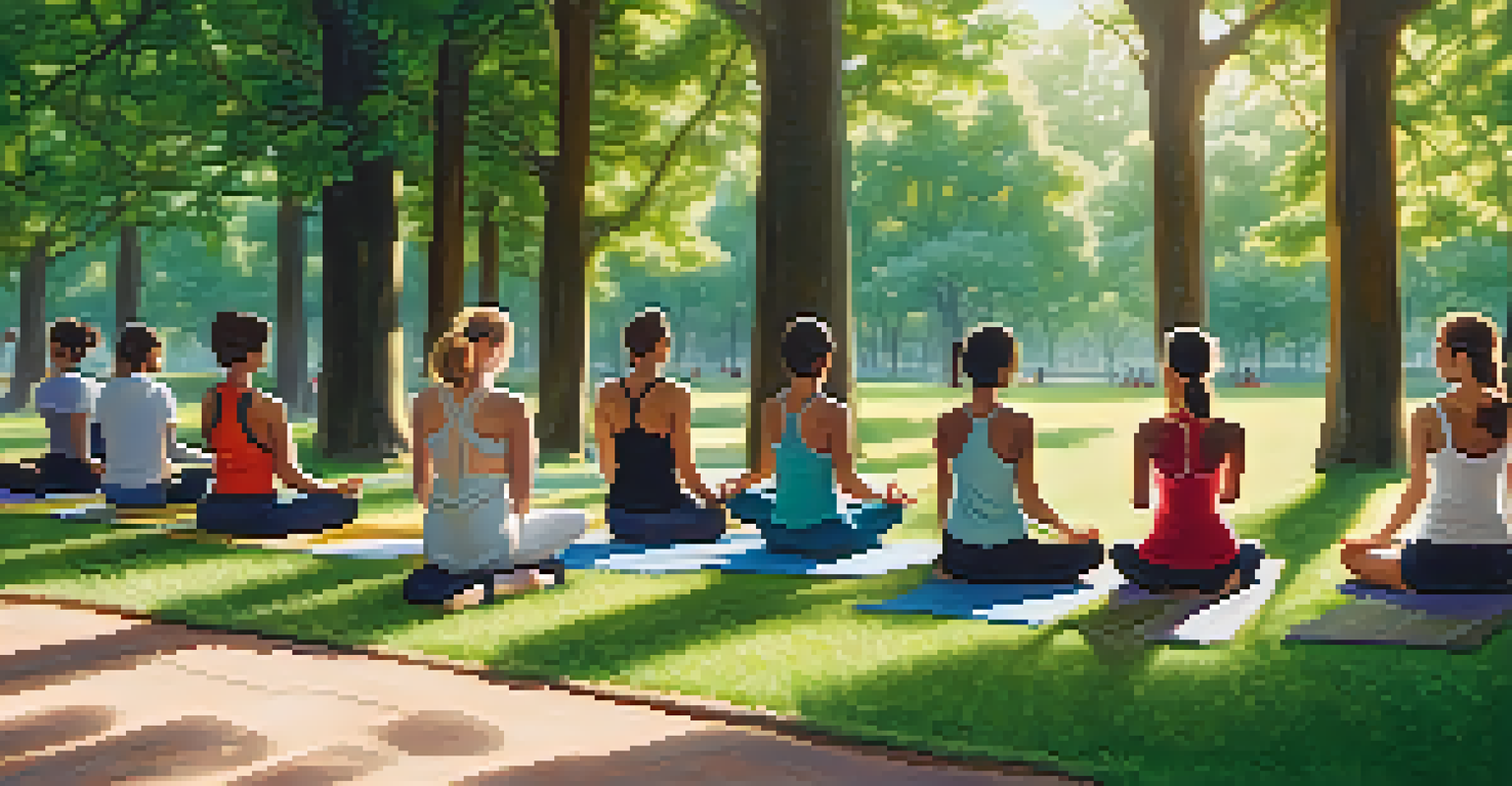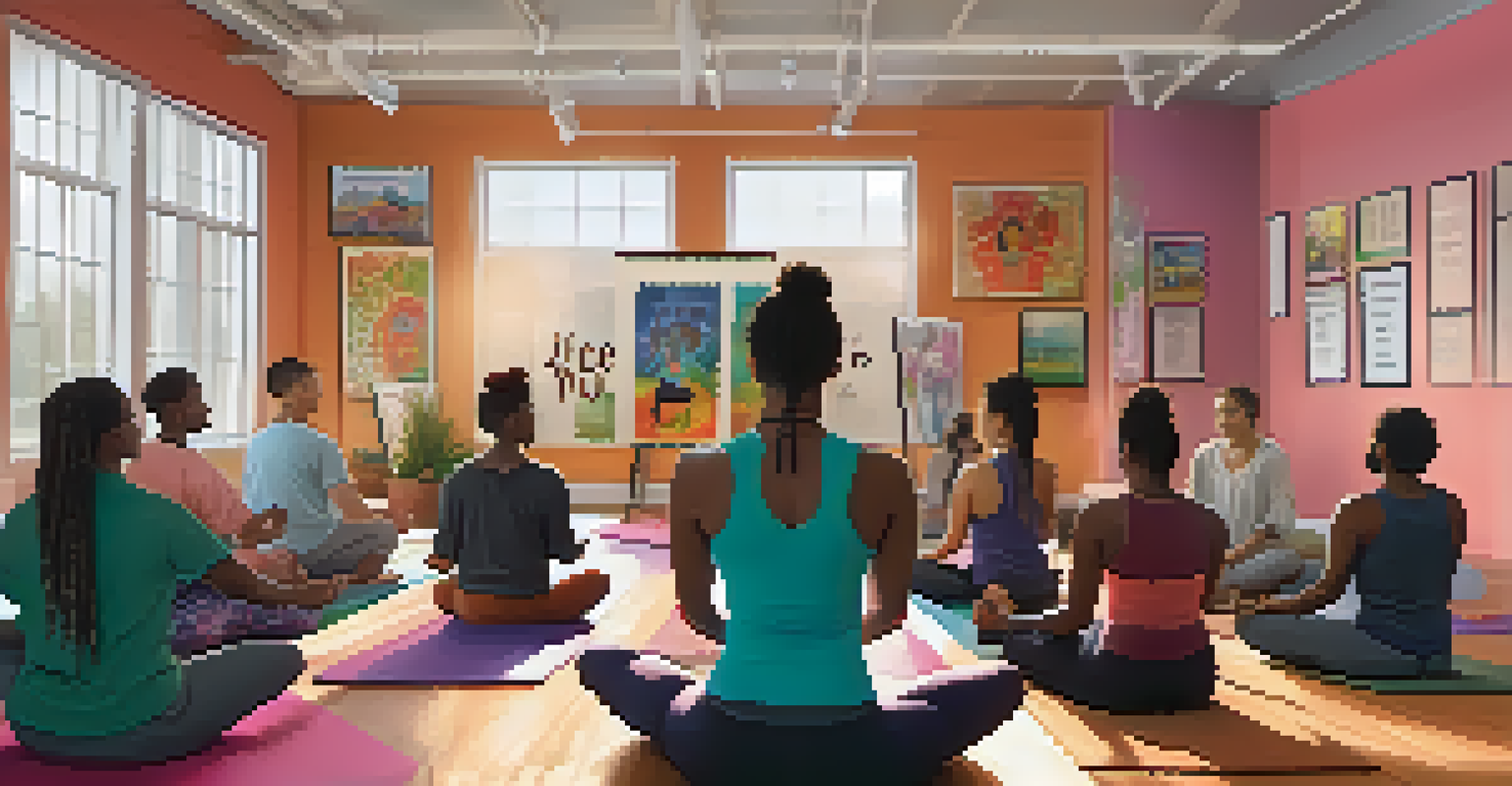Using Yoga to Empower Marginalized Communities for Change

Understanding the Connection Between Yoga and Empowerment
Yoga is more than just a physical practice; it serves as a powerful tool for empowerment. This ancient discipline teaches individuals to connect with their bodies, minds, and emotions, creating a sense of awareness that is often lacking in marginalized communities. By fostering this connection, yoga can help individuals recognize their inner strength and potential for change.
Yoga is the journey of the self, through the self, to the self.
Furthermore, the principles of yoga promote self-acceptance and compassion, which are crucial for marginalized individuals who may face stigmatization. When people feel accepted and compassionate towards themselves, they are more likely to stand up for their rights and advocate for their communities. This transformation can lead to collective action and social change.
In essence, yoga offers a path to personal empowerment that can ripple out into the community. As individuals grow stronger and more confident, they can inspire those around them to join the movement toward change, creating a supportive network of empowered voices.
Creating Safe Spaces for Marginalized Groups
A key aspect of using yoga for empowerment is the creation of safe spaces where marginalized groups can practice without judgment. These environments allow individuals to express themselves freely, helping to build trust and connection within the community. When people feel safe, they are more willing to explore their thoughts and emotions, leading to deeper healing.

Yoga studios and community centers that focus on inclusivity can foster these safe spaces. By providing accessible classes, resources, and support, these organizations can help marginalized individuals feel valued and heard. This sense of belonging is essential for personal and collective growth.
Yoga Empowers Marginalized Voices
Yoga fosters self-acceptance and community support, enabling individuals to advocate for their rights and inspire collective action.
Creating a safe space is not just about physical comfort; it's also about emotional safety. In these environments, participants can openly share their struggles and triumphs, which reinforces their commitment to change and empowerment.
Fostering Community Through Group Yoga Practices
Group yoga practices can strengthen community bonds among marginalized individuals. When people come together to practice yoga, they share not only their physical space but also their stories and experiences. This communal aspect helps to break down barriers and build connections that can lead to collective empowerment.
We can’t just sit back and wait for change to happen; we have to be the change we wish to see in the world.
Additionally, group practices encourage accountability and support. Participants motivate each other, fostering a sense of unity and shared purpose. This camaraderie can be particularly impactful for those who may feel isolated in their struggles.
Through the shared experience of yoga, individuals are reminded that they are not alone in their journeys. This collective spirit can spark movements and initiatives that advocate for change and justice within marginalized communities.
Mindfulness as a Tool for Social Change
Mindfulness, a core component of yoga, plays a vital role in fostering social change. By encouraging individuals to be present and aware, mindfulness helps them to recognize the injustices they face and motivates them to take action. This heightened awareness can transform passive feelings of frustration into proactive steps toward change.
Practicing mindfulness allows individuals to pause and reflect on their circumstances, fostering a deeper understanding of their needs and aspirations. This clarity can lead to more effective advocacy efforts, as individuals become more attuned to what their communities truly require.
Creating Safe Spaces is Essential
Safe environments for yoga practice allow marginalized individuals to express themselves and build trust within their communities.
Moreover, mindfulness encourages resilience, helping marginalized individuals navigate challenges with a clear mind. By developing this mental strength, they are better equipped to face obstacles and work towards meaningful change.
The Role of Yoga Teachers in Empowering Communities
Yoga teachers play a crucial role in empowering marginalized communities. By offering inclusive classes and fostering supportive environments, they can help individuals uncover their potential. These teachers often serve as mentors, guiding students not just in yoga practice but also in personal growth and community engagement.
Moreover, teachers can advocate for their students by creating opportunities for leadership within the community. By training individuals to lead classes or wellness workshops, yoga teachers can help them gain confidence and skills that extend beyond the mat.
In this way, yoga teachers become catalysts for change, empowering individuals to take ownership of their narratives and inspire others to join the movement for justice.
Integrating Social Justice into Yoga Practices
Integrating social justice themes into yoga practices can deepen the impact of empowerment efforts. By discussing issues such as inequality, discrimination, and community resilience during classes, instructors can raise awareness and inspire action. This approach allows yoga to transcend mere physical practice, becoming a platform for social change.
Furthermore, weaving social justice into yoga encourages practitioners to reflect on their roles within their communities. It fosters a sense of responsibility and encourages individuals to think critically about how they can contribute to positive change.
Mindfulness Drives Social Change
Mindfulness in yoga enhances awareness of social injustices, empowering individuals to take proactive steps towards meaningful change.
Ultimately, this integration enriches the yoga experience, transforming it into a holistic practice that addresses both personal and societal challenges.
The Future of Yoga and Marginalized Communities
The future of yoga in marginalized communities holds immense potential for empowerment and change. As more individuals recognize the benefits of yoga, there is an opportunity to expand access and inclusivity. This growth can lead to a more diverse yoga community that reflects the richness of various cultures and experiences.
By prioritizing education, outreach, and community engagement, yoga can continue to serve as a beacon of hope and empowerment. As more organizations and practitioners commit to social change, the collective impact can be transformative.

Ultimately, the future of yoga lies in its ability to adapt and respond to the needs of marginalized communities, ensuring that everyone has the opportunity to experience its profound benefits.